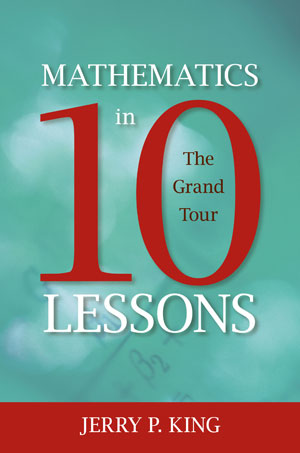
Mathematicians know two things that others do not. They know first that all mathematics flows from a few fundamental principles. Second, they know that aesthetic considerations provide both the motivation for mathematics and the standards for evaluating mathematics research once it is done.
In an earlier book, The Art of Mathematics, I presented to an intended audience of humanists the notion of mathematics as art. There, I emphasized the importance that mathematicians place on aesthetics as they create and then evaluate mathematics. The Art of Mathematics is a book about mathematics rather than a book of mathematics. The present book is unapologetically a mathematics book. Mathematics in Ten Lessons: The Grand Tour contains real mathematics, presented from the point-of-view of fundamental principles.
The topics in Ten Lessons range from basic logic to calculus. The topics are given in ten chapters, with each chapter being essentially a separate lesson. The basic notion is that there exists a large number of educated, intelligent, non-technical people who, for one reason or another, would like to understand some non-trivial mathematics. Moreover they can obtain this understanding provided the mathematics is presented slowly and carefully through the emphasis on fundamental principles. Mathematics in Ten Lessons does exactly that. Each topic begins at the beginning. Almost no prior mathematical knowledge is assumed.
“The mathematician and the poet are essentially mirror images of one another.”
Galileo told us many years ago that, if you want to understand nature, you must read her book. And the book of nature, Galileo said, is written in mathematics. Without mathematics there would be no modern world – no technology, and no science beyond mere description. Go to any bookstore and choose any book that purports to explain natural phenomena. That book’s seriousness can be measured exactly by the depth of the mathematics in which it is written. If the book you chose contains little or no mathematics then you can be certain your book explains real-world phenomena only descriptively.
When scientists or engineers speak about the real world they speak in a language called mathematics. If you want to understand them you must understand a certain amount of mathematics. There is no other way. The necessity to understand mathematics is that simple, and that important.
A basic idea of Mathematics in Ten Lessons is that the best way to learn mathematics is to first learn some small piece of mathematics precisely and correctly. If you learn some part of mathematics correctly, then you can learn any part of mathematics if you must learn it or if you simply wish to learn it. Consequently, the book emphasizes the fundamental principles on which the subject is based.
You need not memorize. Learn the principles truly and well and the rest of mathematics simply flows.
Mathematics in Ten Lessons is intended for an audience of humanists, where humanist is interpreted in the wide sense to mean anyone in the humanities. But, because of the way mathematics has been presented to him or her in the past, mostly as a collection of rules that sometimes work and sometimes do not, a humanist “just browsing” the book will be naturally skeptical.
He or she might overcome some of the skepticism looking quickly at page 17. On this page I write that the typical reader of Ten Lessons might well be a poet. On page 18 I assert, flatly, that “the book is truly written for poets.” At the very end of the book, on pages 377-380, I describe a similarity between mathematics and poetry. In fact, I argue that the mathematician and the poet are essentially mirror images of one another. And who lives more deeply in the humanities than does a poet?
Our browser, like most of us, will have behind experience – perhaps painful – in many mathematics courses. Certainly, the browser had a dozen years of these courses in grades 1–12. He or she might have taken a college course or two in the subject. But it is unlikely that the browser will have thought about the nature of mathematics. Just what are mathematical objects? Where do you find them and who put them there? I address this question early on, on the pages 19-24. I assert that, like Macbeth’s dagger, mathematics lives in the mind.
Moreover I claim that mathematics is created and not discovered. Mathematics is used to explain the real world as mathematicians paint abstract pictures of pieces of the world. These pictures are made of mathematical objects like equations, or infinite series, or matrices. Mathematicians then manipulate the mathematics in these abstract models – they solve equations, sum series, invert matrices. By this process they discover new truths.
A humanist just browsing Mathematics in Ten Lessons will immediately notice the analog between this applied mathematics process and what an impressionistic painter does when the painter selects the salient properties of real-world objects to describe abstractly on canvas, in oil paint. Or what a poet does when the poet discovers eternal truths in ordinary things, as Keats did with the Grecian Urn.
“Mathematics is created and not discovered. Mathematics is used to explain the real world as mathematicians paint abstract pictures of pieces of the world.”
C. P. Snow famously asserted that all of Western intellectual society has become separated into two groups and he claimed that between the two groups there exists a vast gulf – a gulf filled with indifference at best and, at worst, hostility and dislike. Snow called these groups Two Cultures and said that one group was composed of scientists while the other consists of literary intellectuals. We now think of them as being made of scientists and humanists, respectively.
A finer, and more accurate, description of the two cultures is that they are the M-Culture and the N-Culture. The M’s are those people who possess a certain level of mathematical sophistication and the N’s are those who do not. The M’s and the N’s cannot communicate because the M’s speak mathematics and the N’s do not. Thus it is mathematics that forms the gulf between the two cultures. But the gulf can just as easily be thought of as a bridge.
If you are an N you might live a completely happy life without ever understanding the M’s. But, if you want to understand what the M’s do then you must cross the bridge. Mathematics in Ten Lessons shows a way.


Jerry P. King is professor emeritus of mathematics and dean emeritus of the graduate school at Lehigh University, where he spent 45 years teaching mathematics and was awarded two prestigious teaching awards. He is the author of two books, The Art of Mathematics and Mathematics in 10 Lessons: The Grand Tour. He is also the author of numerous research papers in mathematics, mainly in the general area of complex analysis.